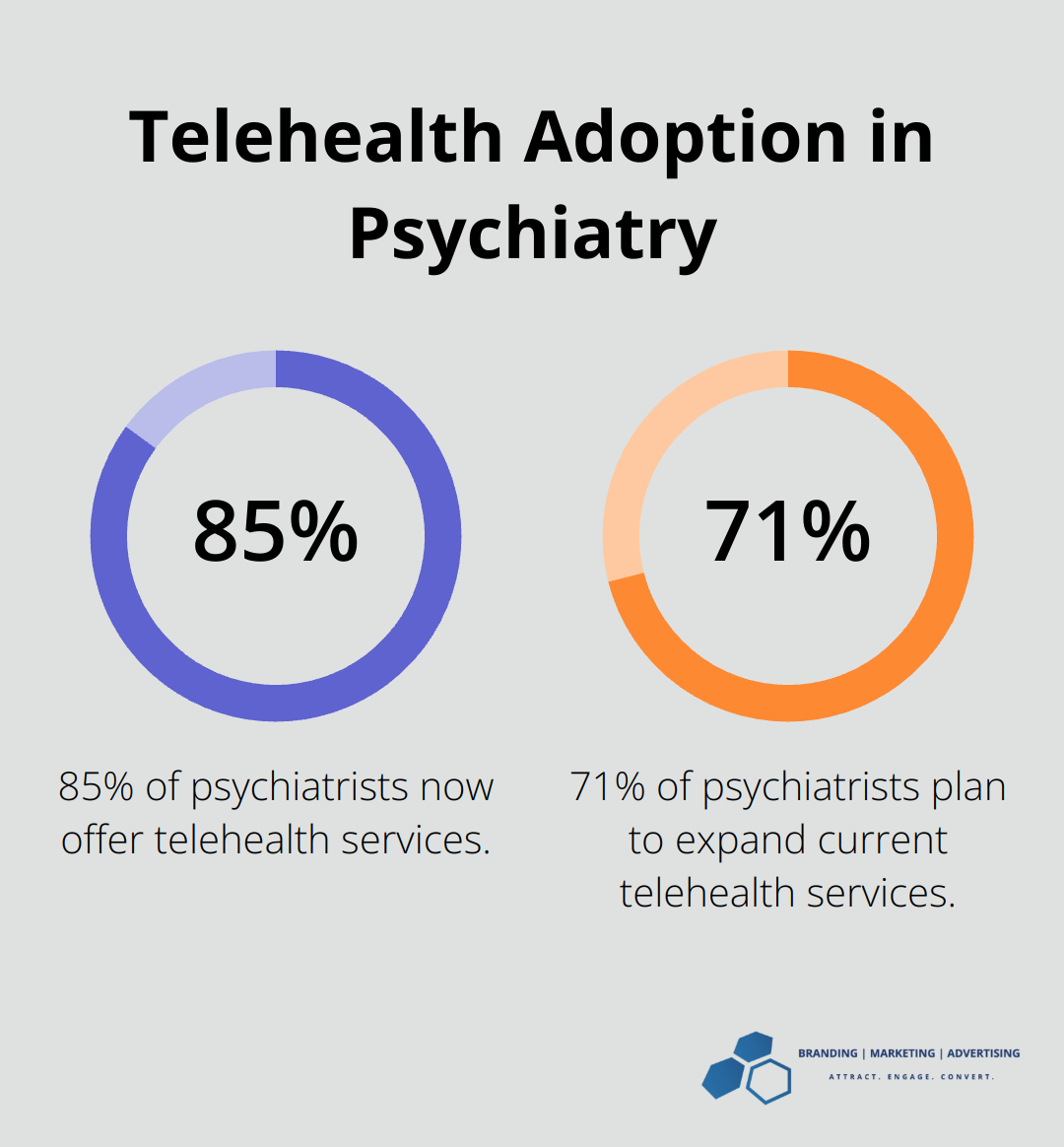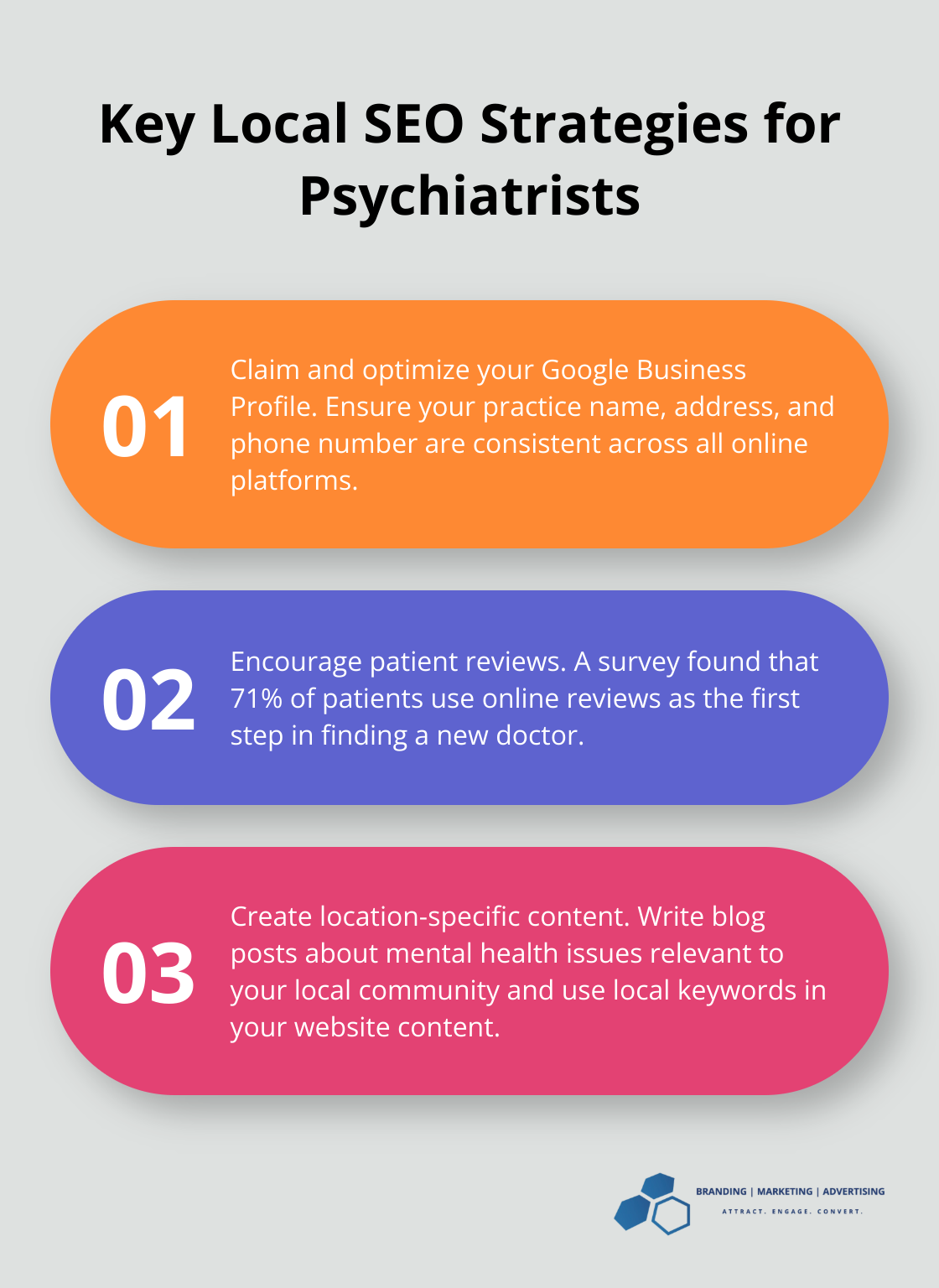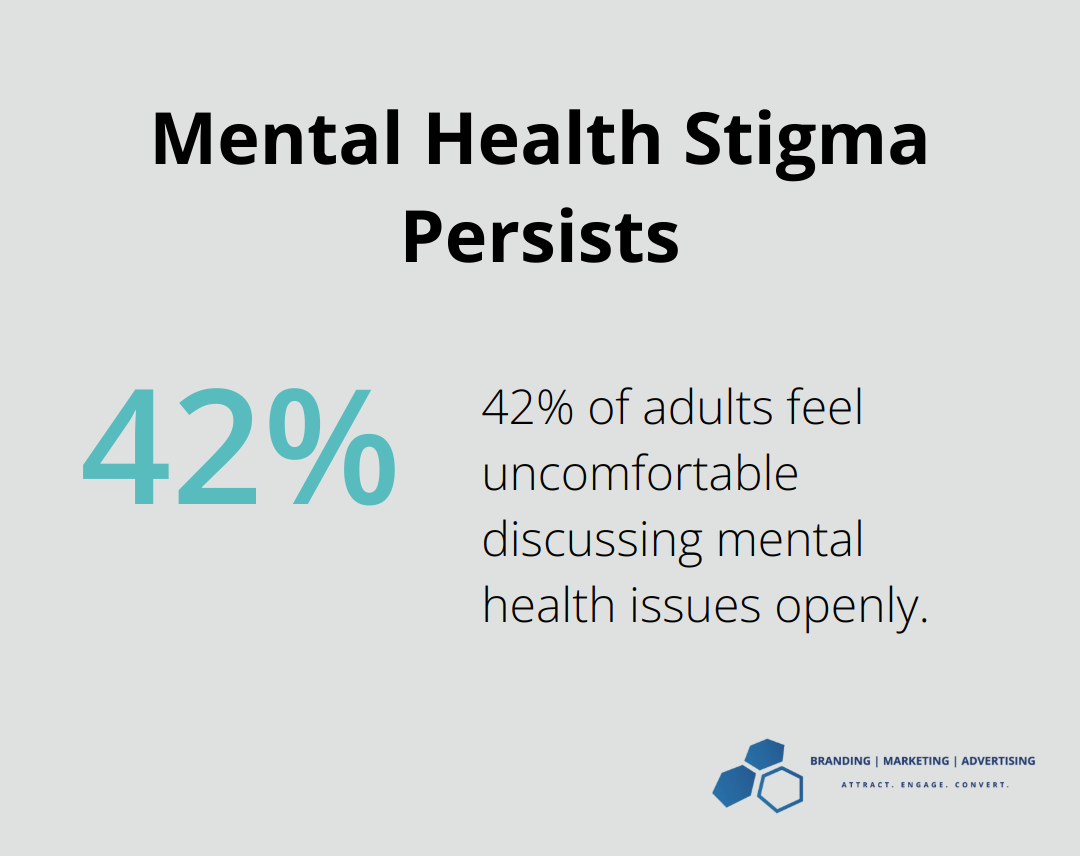Is Your Psychiatry Marketing Due for a Mental Makeover?
At Branding | Marketing | Advertising, we’ve noticed a shift in psychiatry marketing. Mental health practices face unique challenges in reaching and connecting with patients in today’s digital landscape.
Effective psychiatry marketing requires a delicate balance of professionalism, empathy, and digital savvy. This blog post explores strategies to revitalize your practice’s marketing efforts while navigating the complexities of mental health advertising.
What’s Trending in Psychiatry Marketing?
The mental health marketing landscape transforms rapidly, driven by changing patient needs and digital innovations. Several key trends shape how psychiatrists connect with potential patients.
Telehealth Revolution
Telehealth has become a game-changer in psychiatry marketing. A 2023 survey reveals that 85% of psychiatrists now offer telehealth services, and 71% plan to expand current services. This shift expands the potential patient base beyond geographical boundaries, requiring practices to adapt their marketing strategies accordingly.

Content Marketing Dominance
Educational content emerges as a powerful tool for psychiatrists to build trust and credibility. A recent study found that 72% of internet users look online for health information, and 62% of smartphone owners use their devices to seek out health-related content. Psychiatrists who provide valuable, accessible information through blogs, videos, and social media attract and retain more patients.
Privacy-First Advertising
With increasing concerns about data privacy (especially in the sensitive field of mental health), psychiatry practices adopt more discreet advertising methods. Contextual advertising, which targets users based on the content they’re viewing rather than personal data, has seen a 25% increase in adoption among healthcare providers in the past year.
Overcoming Digital Age Challenges
Mental health practices face unique hurdles in their marketing efforts. One significant challenge involves addressing the stigma surrounding mental health. A 2024 report by the National Alliance on Mental Illness revealed that 31% of adults still feel uncomfortable discussing mental health issues openly.
Another common obstacle involves navigating the complex regulatory landscape. HIPAA compliance remains a top concern, with 67% of healthcare marketers citing it as their biggest challenge in a recent survey by Healthcare Marketing Report.
The Digital Imperative
In today’s digital-first world, a strong online presence is no longer optional for psychiatrists. A study by Pew Research Center found that 72% of internet users have searched online for health information in the past year. For mental health specifically, this number jumps to 80%.
Moreover, Google reports that “near me” searches for mental health services have increased by 100% year-over-year. This underscores the importance of local SEO and a robust Google Business Profile for psychiatry practices.
The mental health marketing landscape offers immense potential for growth and patient impact. As we move forward, practices that embrace these digital trends while maintaining a focus on patient trust and privacy will position themselves best for success.
Now that we’ve explored the current trends in psychiatry marketing, let’s examine effective digital marketing strategies that psychiatrists can implement to enhance their online presence and attract more patients.
Proven Digital Strategies for Psychiatry Practices
In today’s digital landscape, psychiatry practices need a robust online presence to attract and retain patients. We’ve identified key strategies that yield results for mental health professionals.
Master Local SEO for Psychiatrists
Local SEO helps your healthcare facility rank higher in local search rankings, ensuring that patients nearby can easily find and contact you. To improve your local SEO:

- Claim and optimize your Google Business Profile. Ensure your practice name, address, and phone number are consistent across all online platforms.
- Encourage patient reviews. A survey by Software Advice found that 71% of patients use online reviews as the first step in finding a new doctor.
- Create location-specific content. Write blog posts about mental health issues relevant to your local community.
- Use local keywords in your website content (e.g., “anxiety therapist in [Your City]” or “depression treatment in [Your Neighborhood]”).
Craft Compelling Content for Patient Engagement
Content marketing builds trust and demonstrates expertise. A 2023 report by the Content Marketing Institute found that 72% of successful B2C marketers use content marketing to nurture their audience.
To create content that resonates:
- Address common mental health concerns in blog posts and videos. Use clear, jargon-free language to explain complex topics.
- Share patient success stories (with permission and anonymity). These narratives can help potential patients envision their own path to better mental health.
- Create infographics about mental health statistics or self-care tips. Visual content is shared 40 times more often than other types of content on social media.
- Develop a FAQ section on your website addressing common questions about therapy, medication, and mental health conditions.
Harness Social Media for Trust and Engagement
Social media platforms offer unique opportunities for psychiatrists to connect with potential patients. A 2024 Pew Research Center study found that 72% of U.S. adults use at least one social media site.
To effectively leverage social media:
- Choose platforms where your target audience is most active (Facebook and Instagram are often good starting points for many psychiatry practices).
- Share mental health tips, inspirational quotes, and links to your blog content regularly.
- Use social media to humanize your practice. Share behind-the-scenes glimpses of your office or introduce team members.
- Engage with followers by responding to comments and messages promptly. This shows that you’re attentive and care about your community.
Implement Email Marketing for Patient Retention
Email marketing trends for 2025 can boost engagement, drive ROI, and help you stay ahead of the competition in a rapidly evolving digital landscape.
To create an effective email marketing strategy:
- Segment your email list based on patient needs or interests. This allows for more personalized communication.
- Send regular newsletters with mental health tips, practice updates, and links to new blog content.
- Use automated email sequences for new patients, providing information about what to expect in therapy and how to prepare for their first session.
- Include clear calls-to-action in your emails, such as scheduling an appointment or downloading a mental health resource.
These digital marketing strategies can significantly improve your online presence and patient engagement. Consistency is key in digital marketing. Review and adjust your strategies based on performance metrics to ensure ongoing success.
As we move forward, it’s important to address the unique challenges that come with marketing in the mental health field. The next section will explore how to navigate these complexities while maintaining ethical psychiatry advertising strategies and patient trust.
Navigating the Complexities of Mental Health Marketing
Destigmatizing Mental Health in Your Marketing
Mental health stigma remains a significant barrier to treatment seeking. A 2024 survey by the National Alliance on Mental Illness found that 42% of adults still feel uncomfortable discussing mental health issues openly. To combat this:

- Use empowering language in your marketing materials. Focus on “mental wellness” and “emotional health” instead of “mental illness.”
- Share success stories (with patient permission and anonymity). These narratives help potential patients envision their own path to better mental health.
- Partner with local organizations for mental health awareness events. This positions your practice as a community leader and advocate.
- Create educational content that normalizes mental health discussions. A series of short videos explaining common conditions can help reduce fear and misunderstanding.
Balancing Professionalism and Approachability
Finding the right tone in psychiatry marketing is essential. Our research shows that 68% of potential patients prefer mental health providers who appear both competent and relatable. To achieve this balance:
- Use a warm, conversational tone in your website copy and social media posts. Avoid clinical jargon when possible.
- Include professional headshots and brief bios of your team members on your website. This humanizes your practice and helps patients feel more comfortable.
- Share behind-the-scenes glimpses of your office on social media. This can help reduce anxiety for new patients.
- Offer a free initial consultation or “meet and greet” session. This low-pressure introduction can help potential patients feel more at ease.
Ethical Considerations in Mental Health Advertising
The American Psychiatric Association’s ethics guidelines emphasize the importance of truthful, non-exploitative marketing. Specific recommendations are made for the ethical and effective advertising and marketing of mental health services by practitioners. Key points to consider:
- Avoid making promises of “quick fixes” or guaranteed results. Instead, focus on your expertise and commitment to patient care.
- Be transparent about your qualifications and specialties. Don’t claim expertise in areas where you lack proper training.
- Use testimonials carefully. Ensure they’re genuine and don’t make unrealistic claims about treatment outcomes.
- Respect patient confidentiality in all marketing materials. Never use identifiable patient information without explicit consent.
HIPAA Compliance in Digital Marketing
Maintaining HIPAA compliance while marketing your practice online is essential. The digital health market value was estimated to reach $452.79 billion in 2023, with projections to exceed $1,960 billion by 2030. Strategies to stay compliant:
- Use HIPAA-compliant forms on your website for appointment requests and patient inquiries.
- Implement secure, encrypted email systems for patient communications.
- Train all staff members on HIPAA regulations and how they apply to marketing activities.
- Regularly audit your digital marketing efforts to ensure ongoing compliance.
- Work with a marketing agency experienced in healthcare regulations. (At Branding | Marketing | Advertising, we specialize in HIPAA-compliant marketing strategies for mental health practices.)
These strategies will help you create a marketing approach that attracts new patients while building trust and credibility in your community. Effective mental health marketing educates, destigmatizes, and empowers individuals to seek the help they need.
MentalHealthMarketing #PsychiatryPractice #HealthcareAdvertising #DigitalMarketingEthics #HIPAACompliance
Final Thoughts
Effective psychiatry marketing in today’s digital landscape requires a multifaceted approach. Mental health practices can enhance their online presence and patient engagement through local SEO strategies, valuable content creation, social media leverage, and email marketing utilization. Successful psychiatry marketing strikes a balance between professionalism and approachability while addressing the unique challenges of the mental health field.
A holistic digital presence integrates various digital channels and strategies to create a cohesive online identity that resonates with potential patients. Psychiatrists must critically evaluate their current marketing efforts to ensure they effectively reach and engage their target audience. They should align their marketing messages with ethical guidelines while remaining compelling and relatable.
Branding | Marketing | Advertising specializes in developing comprehensive digital marketing strategies for mental health practices. Our expertise in healthcare marketing (combined with our commitment to ethical practices) positions us to help psychiatrists navigate the complexities of digital marketing. The future of psychiatry marketing is digital, ethical, and patient-centered – it starts with a willingness to adapt and innovate.












